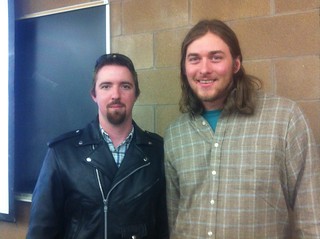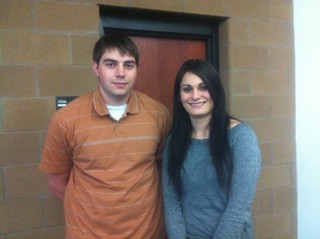

- Photos by Armando Montano
(L to R) Gary Mark-Potter & Dan Carver, Josh Machone & Amber Harlan
Armando Montano
The Paw Print
Last Wednesday’s lunchtime talk was on the works of the Porter Scholars Focused Academic Programs in different fields of study. Collecting the data of two different scientific aims to contribute to the scientific world community.
The two student projects were compiled and synthesized into 20 minute presentations of the groups’ aims, progress, data and findings. The talks were broken down enough for even those furthest removed from the area of study could understand the happenings of the students’ progress. First to present their area of focus was Amber Harlan and Joshua Machone, presenting their work on the “Examination of 5s rRNA IGS region in Pythium”. Ultimately the group was seeking out to isolate and sequence the 5-8kb intergenic spacer region in their field tests.
The topic was considered by many in attendance to be very intricate and to those far removed from biology, difficult to understand the application and even intimidating, both Harlan and Machone were able to take a difficult topic of intensely specific focus and present to the majority of the audience the importance of their process and the significance of their efforts in the attainment of their goals.
The other presentation followed immediately after was Dan Carver and Gary Mark-Potter’s work on “Determining the age of Dirt”. In the course of their presentation, Carver and Potter were able to explain to the audience their work in the dating process of soil samples and their ongoing collaboration with other scientists, particularly Dr. Hong Wang of Illinois, to find a numerical date and not just estimates of certain soils found in several testing sites around the San Luis Valley.
Both of these groups composed the overall theme of the lecture, “Porter Scholars: Focused Academic Programs 2011-12” and were great demonstrations of the work ASC Students to the scientific community in their focused areas of study. The works done by the groups in the presentation and in other similar groups here at Adams are able to continue their research and collaboration in part due to financial support of grants and donations made to the ASC Science department by William Porter. While the funding of educational programs are sure to provide the learning student the necessary elements to academic success, the contributions of outside sources are needed to help give the students who excel in the science program to have the opportunity to give the whole of society a contribution back. It’s the continual support of the community and other scientific and educational institutions that allow ASC students to not only break into their respective fields in life but to also excel in their careers.
The Adams State College series of Lunchtime talks will continue with the next talk to be held on April 11th with a special to be announced presentation from Dr. Robert Astalos of the physics department, at noon in Porter Hall room 130.
Like all past talks the lunchtime talk series is free and open to the public to attend. For further information on the Lunchtime Talks, feel free to contact Dr. Matt Negring at msnehrin@adams.edu or 587-7504.
What’s Been Said…